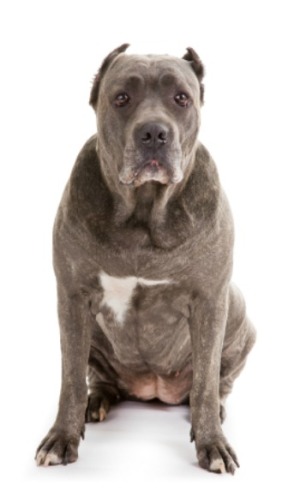 I recently took in an abused female, maybe a Bluetick, who had been running for a week in a high-traffic area with a collar, but no tags. 4 weeks later, after being treated for pneumonia, she had a litter of 7 pups.
I recently took in an abused female, maybe a Bluetick, who had been running for a week in a high-traffic area with a collar, but no tags. 4 weeks later, after being treated for pneumonia, she had a litter of 7 pups.
I don't know whether Shekinah had ever been an inside dog before (this is a popular area for hunters) and we had just been making strides housebreaking her when the pups and motherhood intervened.
A long intro to my current problem: Shekinah is now peeing on her/our bed (the pups are 9 weeks now and she's separated from them), settling into being an inside dog along with my Blue Heeler. Worse, maybe, she'll do this after having spent a long while outside. Having followed her around sometimes out there, I see that she's ever with her nose to the ground, but I almost never see her peeing.
I still have 6 of the pups and am trying to housebreak them too, but in a sequestered area. I'm losing my bearings, trying to cope with their mom's peeing also. Shekinah's been abused, as said and is easily scared, but trusts me. I try to be gentle with her, but that king-size comforter has been through my laundry 5x in the last week.
Oh, she'll pee in other places inside as well, but I don't understand the "where she sleeps" urination. I also don't understand why she fails to pee outside. I read through all the past postings here about this, but nothing is quite relevant. Please help?
By Nica from Big Bend, WV
Possibly her bladder is weakened and she can't seem to help it or just the overwhelming of motherhood is getting to her. Have you thought of Simple Solutions Washable doggie panties (amazon.com) sells them and they make them for both males/females; just insert half a Kotex pad in before putting on the dog. This helps some, but you will still need to check her often.
If you don't want to buy into this idea, try a boy or man's pair of undies and cut a hole in the backside for her tail. Insert a pad and she's ready to go. Since they come several in a package, you can buy a couple for the price of one Simple Solutions. TIP: Try putting a pair of family member's on her to see if you think it will even work. it'll help guide you toward the right size.
I agree it may be a medical problem that would be easy to fix with just a pill once or twice a week. My dog has had leaky bladder syndrome for 11 years and used to wet on our bed. The pill (DES) took care of it immediately. Maybe having the pups affected her ability to hold urine. Once it is determined that the pills work (if that's the problem) you can get them much cheaper online (such as Drs.
You guys are great! Thanks for the suggestions so far.
Shekinah is a marvel, & I'm so please with the huge strides she's made so far. That she trusted me from the beginning, & is so sweet in general, after what I sense had been a life of neglect & perhaps active abuse for 1-1/2 yrs is just pretty amazing to me.
Sometimes it's the old adage: For every step forward, two back. So I'm as gentle with her as I can be, though I admit to losing some self-control in verbal corrections from time to time ... seldom, but still too much. She knows it's wrong, & piddles/poos inside anyway.
Here's what you guys -- as well as some other related threads here -- have suggested in terms of possible *proximate* causes & what to ask my vet:
*** DES for leaky bladder, if that's a post-litter problem?
*** Cystolamine for same?
*** Check into possible Cushing's Syndrome (had a Shih Tzu once w/ this lifelong disease)
*** Elavil/Amitriptylline for stress?
Anyone have (further) comments on any of this stuff, before I talk to the vet on Tuesday next week?
For my research, according to what I've read here, DAP is supposed to work something like Feliway spray/diffuser for calming cats. I've tried Feliway, but can't really tell if it made a difference at all for my felines.
Also I'll check into possible clicker training techniques, though I rarely catch Shekinah in the act.
Ah, I will also have her spayed. (Even though my male dog is neutered, I've just had an electronic fence installed for both, & other dogs of course can enter into that perimeter. BTW, Shekinah took to that surprisingly well. It's Ben I'm having a problem with in terms of his comprehension of how it works. He's afraid of even venturing near it.)
Thanks again, really! Please continue to help me on this, since I need as many suggestions as I can get. (My vet is non-communicative so it's hard to work w/ him, but he's all I have unless we want to drive 1+ hr to find another.)
I would recommend doing some crate training with her. After checking out the medical issues already mentioned, she may be needing some sense of security. Having her own space that she can go to (as well as sleep in) might help. That is also a way to housetrain dogs.
Here are the questions asked by community members. Read on to see the answers provided by the ThriftyFun community.

By Michelle J. from Sioux Falls, SD
She sounds like the boxer we adopted over a year ago. We used no physical training on her either she was also afraid of
Men. It just took a lot of time love and patience. We made sure there was a man present everyday to interact with her slowly she got used to them and started coming close and close now she loves the men of the family more than us women. She has now comfortable with the kids and played well with out growling and nipping . She also had food aggression problems we just slowly moved closer and closer while she ate. We never yelled or raised our voice just a firm no or ahh type noise and tons and tons of praise. Good luck!
Honeybees had great advice about making sure your pup gets used to having a male present on a regular basis. I will offer this additionally; have the man be the one that the dog sees filling its food and water bowls. It may take some time for a bond to form, but this warmed my man-hating dog up to my then husband pretty fast. Good luck!
With regard to her being afraid of your father it could be something very simple like his clothing or aftershave. Does he always wear dark clothes for example. I had a Cocker Spaniel years ago who loved everyone except a man wearing dark clothing whether the mail man or my uncle who was a priest it didn't matter to her, they were the enemy (I got her when she was about 3 years old so I had no way of knowing her history). A friend of mind had a dog who hated a certain brand of aftershave. It will take time and patience but try to keep calm, dogs are very sensitive to the tone of your voice and if they're nervous a loud angry voice will only add to that.
Just patience and a lot of time, always works. Never give up. She will come around slowly. It think too many people give up and discard problem dogs. I also have an abused dog and it took a good year to get him retrained from his bad habits.
Like others pointed out, she is afraid of men, and I suspect that she was abused by a man. Great patience, time, gentleness and having your father do positive things like feeding and petting her, will help her get over her fear. He should not walk straight toward her, either, for that seems threatening to her. He should approach her slowly from an angle, but within her sight, and speak softly and kindly to her as he approaches. Tone of voice is important, as dogs are highly sensitive to our tone, so avoid speaking sharply, loudly or with any hint of anger or impatience. The barking and growling are probably signs of fear, and she needs to be re-assured that she is safe and loved. Good luck, and bless you for working with this poor dog, who certainly deserved a better start in life. Please keep us posted on her progress.
I am also from Sioux Falls, SD. I would highly recommend seeking the advise of a dog trainer in town (The Dog's Listener). He is very good at what he does. Here are some tips I would personally suggest:
First, I would suggest that you walk with the dog a minimum of 5 days a week. The 'walk' is very therapeutic for dogs mentally and it will also help build your bond with him. The catch is that the walk is only useful if it is done correctly. The dog cannot be pulling or distracted. He needs to be focused on you and moving forward. This will take time, patience and determination, but is vital to having a happy dog.
Also, lots of exercise will help to calm him by buring some of that nervous energy. All Terrier breeds are known for their high energy.
I would use techniques that display leadership rather than dominance. You don't want to challenge the dog, but rather show the dog that you are the Alpha and he need not worry about anything because you are in charge. The leader of a pack would not allow another member to be emotionally unstable. Use a 'touch' correction - where you use your fingertips as teeth and jab the dog in the neck just enough for him to feel it, but be sure not to push, just jab. This is normal in the dog world and the dog would associate that with a bite from another dog rather than abuse from a human. This dog needs and wants leadership and instruction so he can feel calmer. Note, it is counter productive to pet or caress your dog when it is nervous. That only reinforces the behavior. Dogs, unlike humans, don't need to be coddled when they're upset, they want and need to be able to look to a leader that they trust to make the decisions and to take care of them. It is calming to a dog that is not alpha dominant to be directed in some way. A good distraction is to command the dog to sit or lay down.
Once YOU have built your relationship with your dog and he trusts you, it will be easier for you to get him to accept your father. For this, we need to build a relationship and trust between the dog and your father. First, your father must be patient and not display agitation that the dog does not like him. The dog will pick up on that negative emotion and therefore will not respond like we want.
You should take the dog out walking with your father. Start with you holding the leash and your father walking on the other side of you, (how far away depends on the reaction of the dog). Gradually, have him move closer and eventually take the leash from you and walk the dog himself. Again, this will take time, patience and determination on both of your parts.
At the same time, at home we can do some exercises that will help develop trust. With a treat, your father is to gradually try to get the dog to come to him. To do this we need to make sure we are aware of how dogs view body language. A dog sees prolonged eye contact and full frontal body exposure as a challenge. This will immediately scare off the dog. We want your father to not make eye contact (it's harder than it sounds) and not to come at the dog with his body positioned square with the dog. We want to use our peripheral vision and we want to position our body to the side and get on the floor rather than standing. This demonstrates non threatening behavior on the part of your father. I suggest your father use a small bit of hot dog to be able to get close to the dog (hard to resist a hot dog!). He can position the piece of hot dog 10 feet away or so and then gradually closer and closer to him so the dog gets closer and closer to him. This will help desensitize the dog to your father and help the dog see that your father is not a threat (like some other male figure in the beginning of the dog's life).
During any of this training it goes without saying that continuous positive reinforcement be used when the dog does something good. This can be talking in a soft, high pitched voice, a scratch in a favorite spot, or a treat.
This is not, by any means, an exhaustive list of to do's. This is just a quick blurp of info. I know once I re-read this that I will say, "oh i should have put that" or "I forgot this"! I volunteer at the SFAHS so if you need any other tips hopefully we'll run into each other someday! Good luck and watch the Dog Whisperer on The National Geographic Channel!
EXERCISE - DISCIPLINE - AFFECTION (in that order!)
**Kudos to all of the ppl out there that have a shelter pet!!

Mfisher, God Bless you!
Michelle J, I am completely and utterly impressed with mfisher's advice to you! I suggest that since you live in the same area that you go to the SFAHS where she volunteers and ask when you can meet her and let her know of your progress with your beautiful Pitty and ask more questions if need be!
My husband and I purchased Ben off a Craigslist ad. We met the people and they seemed very nice. But on getting Ben home, if you use a stern voice he cowers. When he pottied inside we used the same method we used on our 2 year old Lab. We made him smell it and said no and lightly spanked him. My husband did it, I didn't have the heart to. You'd think he was beating him, because Ben was crying and trying to get away from him.
We had to coax Ben to come back to my husband afterwards. He was scared of him! Not to mention that when we got him you could see every little bone in his body! I've never been in this type of situation before and don't know how to potty train him. I need some help.By Meg D
I just purchased a 2 year old Welsh Terrier. I think she has been abused. She has always been outside. I take her out for long periods of time, and she doesn't do anything, then when I take her in she goes potty. How can I housebreak her?
By Beverly R.
I just got a 1 1/2 yr old male min pin from an abusive home. I am having the biggest problem with this potty training. I have other dogs that I potty trained, but he is being difficult. I have him in a crate at night and when we are not home. He still urinates in it! Does anyone have any advice?
By Liz from St. Louis, MO
My best advice to you is to be patient with him. My boy Chance (pictured) was also terribly abused (who could hit that pretty face?). It took me a good 6 months to fully potty train him as an adult, because even talking sternly to him scared him to death. It took a lot of positive reinforcement (treats, pats on the head, and his favorite- hugs) when he did go potty outside. He did finally get the hang of it though. Don't give up- your little guy just doesn't understand yet.
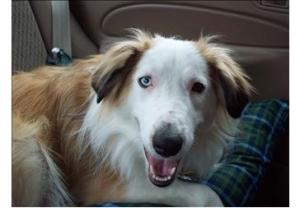
If a pup is raised in a sloppy manner and left in it's own poop and pee it will never learn to not poop and pee in its own immediate area, without lots of training, bless it's heart!
Please don't cater to any of his nervousness. Only pay attention to positive behavior. When it is time to go out then make it exciting, but not enough to scare him. Grab a handful of hot dog pieces the size of a green pea and head out the door with him saying "outside" and throw a piece out the door. If it won't come out of it's crate, use the hot dog to get it to come out of its crate. When you are taking him outside, go to the same place all the time, and then when he goes, after he is done completely with his business, throw a marker down, or a piece of hot dog. Don't feed him hotdog's any other time so they will stay special. Go to leerburg.com and put nervous dog or housetraining in the search bar. There are lots of free articles at this site and I trust it as far as good information on dogs.
Mainly relax and don't respond to anything in a negative way and take the food and water up at six oclock at night
so it will not have as much water in it's bladder overnight.
If you like, let me know how it is going!
Robyn
They do need lots of time and attention when it come to potty training. I suggest that if you can stay home during the day. I would do that. This will give you more time for bonding and so that your new dog won't feel left alone...yet again. It would be much easier for the potty training.
Good Luck to ya

All of the feedback was really good advice and should help you tremendously. I would only offer one other suggestion: make sure his crate isn't too big. Sometimes if the crate is too big, the dog will have enough space to potty on one end and then sleep or lay on the other end. Mainly I really second (and third!) the opinion that you should use lots of positive reinforcement and ignore unwanted behavior.
Last Friday I got a 2 yr old Cockapoo from the dog pound. He's beautiful and so friendly - but has similar signs of possible abuse. He also urinates when startled, messes in the house when we're out, and cries when he's alone. I bought a dog kennel tonight and I'm giving that a try for a few hours at a time.
My other problem; he doesn't bark. He can, but has only barked once in 5 days. How do I train him to tell me when he needs to go out if he doesn't bark? He'll go out when I ask - but he won't tell me.
Any help would be appreciated!
Maybe you can try what works with my 3 dogs. I do everything as a routine, and each night at bedtime, I call their names in the same order and add "Let's go outside to the bathroom." It's such a habit with them now that I don't even get all 3 names out before they run out the doggy door. Last night when I made my 'bathroom' announcement, one dog was just coming in the doggy door, and he turned right around and went back out. It was quite funny to see. Dogs love a routine, just as children do. Meanwhile, you could also try taking him to the area of your yard where you want him to go after he eats. If you stay out there with him until he goes a few times, he will start going there by himself.
I also had that same problem with a min pin I had found. After a while he will stop going in his crate but it took a while for him to figure that out. Luckily, you have other dogs, this usually helps. I would be very upset when my dog pottied in the house and let him know that. I would always make sure to get very excited when taking him and my other dogs out to pee. I always sing lets go potty outside.
When He goes potty outside always say good potty. Lots of praise. Take him every couple of hours when you are home for at least 2-3 weeks. He will catch on soon. An adult dog is a little harder to housebreak, because they are so used to going at anytime anywhere and never been taught to hold it. They don't know that they can hold it. Just takes time!

We have just adopted a Lab mix. She is 10 months old. How do we potty train and train her in general? Her name is Bella. She was spayed the day before we could bring her home. We have had her 5 days now. She keeps peeing/pooping in the house. She very seldom goes potty outside. She will pee outside, but not often. I am overwhelmed with this, and she steps in it and it gets over everything.
We just found out today what happened to her, and it is heartbreaking. Bella is so sweet and lovable. She does chew things too, but I assume that is the puppy in her. How do I train her? For potty training and training in general. I thought about a crate, but not sure how she will do.
We just adopted an older, abused dog from the pound. He has only had 2 accidents in the house the last 5 days, but we are beginning to believe he wasn't properly housebroken to begin with.
Any suggestions to help us train him?I just got a rescue dog, he was abused and abandoned and we took him in. We think he's at least three years old and he's a Yorkie mixed with Westie. We take him outside and he goes every time, but he gets back inside and two minutes later he pees on something.
We aren't sure how to train him, but he acts like he knows how to tell us to take him out, but he won't do it. I'm sure he's scared because he was abused, but he needs to stop peeing in our new house. Help! Three weeks ago I adopted an abused 7 year old Maltese, a sweet little girl. She was kept in a cage for 7 years. She goes outside when I am home, but when I go out she messes. I use training pads and she uses them, but I would like to train her to hold it until I get home. Caging her is not the answer since she was used to sitting in her filth. She is an angel. Any suggestions how I could achieve this while I continue to build up her broken spirit would be appreciated.
Three weeks ago I adopted an abused 7 year old Maltese, a sweet little girl. She was kept in a cage for 7 years. She goes outside when I am home, but when I go out she messes. I use training pads and she uses them, but I would like to train her to hold it until I get home. Caging her is not the answer since she was used to sitting in her filth. She is an angel. Any suggestions how I could achieve this while I continue to build up her broken spirit would be appreciated.
By Dolores A
We adopted a dog back in July of 2016 when he was was 7 months old. We believe he was abused because he has scars around his neck like he was chained up constantly. For a couple months after we adopted him he wouldn't go outside by himself. He is now 1 year old and we are still having issues with him listening. He has nervous habits like constantly licking you or gnawing on you when you give him attention. The worst is his peeing though.
He can stay out of a crate for 9 hours a day while we are at work. But will just start peeing for no reason. I don't want to spank his butt because he was abused. But I don't know how to discipline him in a healthy way. I also have a two year old daughter and he growls at her when she is close to him. He has even tried nipping at her a couple times. Please help we feel like we are at our breaking point.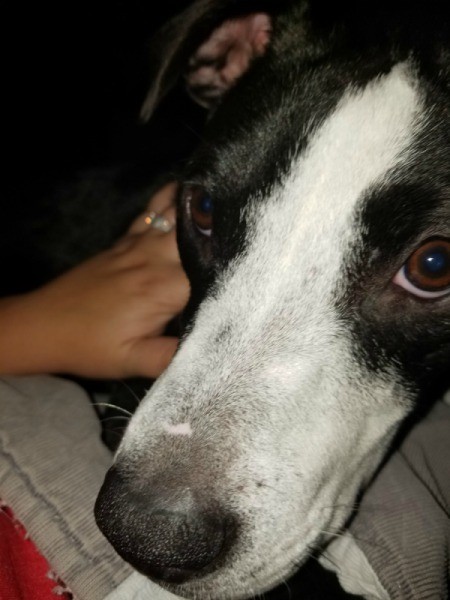
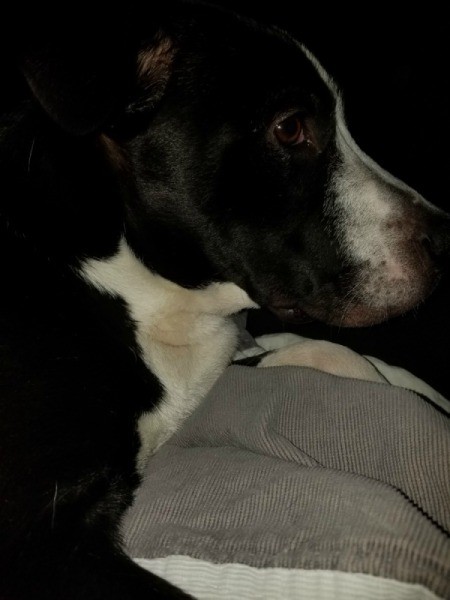
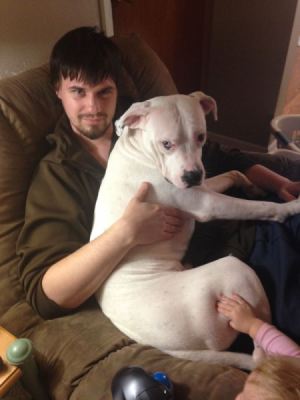 Well first off I bought a dog "online". He was about 5 months old at the time. He was in shock when we got him home and we thought he was deaf. After a week or so he started warming up to everyone in the house. everyone, but me. He'll come by me only if I'm laying down, but when I get up he'd rather run through the gates of hell than face me. Anyway to make a long story short he's about a year old now and he has yet to warm up to me. He's skittish and jumpy.
Well first off I bought a dog "online". He was about 5 months old at the time. He was in shock when we got him home and we thought he was deaf. After a week or so he started warming up to everyone in the house. everyone, but me. He'll come by me only if I'm laying down, but when I get up he'd rather run through the gates of hell than face me. Anyway to make a long story short he's about a year old now and he has yet to warm up to me. He's skittish and jumpy.
By Stephen
I just adopted a 3 year old Boxer Cur mix and was told she has been abused. She is not housebroken and she's scared to death of the leash.
Could you please tell me what I can do to help her?
We adopted a 3-year-old terrier/Pit mix last week. He was neglected in a crate and never taken out. He has scars on his feet and legs from the infections caused by standing in his urine and feces. At the shelter, they completed extensive medical testing to ensure that there were no bladder issues and all checked out OK.
We have been training him by taking him out every hour and rewarding him when he goes outside, but he doesn't appear to even know when he is peeing. He doesn't hike his leg or stop walking. He just walks around peeing. We tried to not have him in a diaper when he was in the house, but he just seems to be dripping and peeing all the time.
When we are gone (to work and school) we have been letting him stay in the garage and not have to stay in his crate due to the past neglect. We come home to streams of urine all over the garage as if he has just been walking around peeing all day.
We love him and he is really responding to our kids and our love, but we don't seem to be making much progress with the house training. My 13 year old wants him to sleep in his room, but he is getting up all night long taking him out every time he gets up in the hopes that he won't pee in the house, but he still does.
Any suggestions are greatly appreciated.
When we went to pick up Bear he was in a home with 4 other dogs, 7 cats, and who knows what else. He was terrified to touch the grass. They used a shock collar, and we are pretty sure abused him as well. It took us days for him to warm up to us and to walk on to the grass on his own.
Fast forward just over a year, we have had to use a crate during the day because about 4 months after we got him he started going to the bathroom in the house while we were gone. It's not that he hates his crate, but he certainly doesn't like it. I have to pick him up to put him in it. And now he's taken to trying to hide in a corner so I think I can't get him. He shakes like crazy. I hate it. I need help getting him to be OK with the crate or to not use the bathroom in the home. I work full time, my kids are in school all day. What can I do? I feel so bad.
My wife and I rescued a 6 month old cur mix that was left outside of a foreclosed and vacant house. We used the crate method with my 1 yr old cur mix and had great results. The new dog however literally hates the crate and will go crazy every minute she is in it. We can reward her well when she goes outside, but she continues to go inside as well. Before bedtime we take her out again and she will lay down and almost refuse to go.
We confine her to the garage at night and I wake up in 2 hour intervals to check on her and take her out to go potty. Every time I wake up she has already gone multiple times in the garage. I know she was abused as well as abandoned. Does the abuse cause this behavior or are we doing it wrong? My 1yr old was trained easy though we had him when he was only 2 weeks old. He was rescued as well. Please assist. Thank you.By Ben B
We got our 6-year-old Minpin Zippy almost a year ago. She's a puppy mill rescue and we knew immediately she was abused. In the past year she's learned some things and has gotten to be more of a normal acting dog, but we don't know how to potty train her.
We've been using puppy pads and we've tried putting her outside on a schedule multiple times a day, but she will still come in and pee on the carpet almost immediately after coming back in. We've been told to not even try a crate from the woman we got her from because she associates it with the fear and abuse she went through her first 6 years before she came to us.
I recently took on a severely abused Chihuahua. At the time I got her I didn't know her owner had abused her. She is three years old and has had two litters of puppies. When I took her home she was covered in fleas. I was finally able to get rid of her fleas then I noticed that when she went to go potty she had tapeworms. She acts like she is terrified to eat and shakes all the time. She will go out and potty when I take her outside, but as soon as I bring her in she does it again like 3 or 4 times.
I don't get on to her because I don't want her to be afraid of me. How can I house train her while I'm trying to build trust? She is a very sweet dog and she lays on me all the time. She doesn't appear to be afraid of me, but I don't know what to do. Can you please help me?